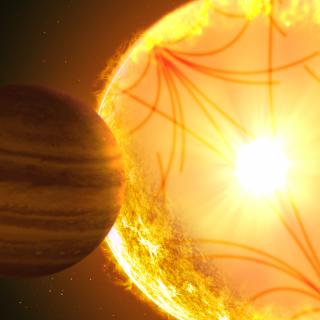Bibcode
Karoff, C.; Metcalfe, Travis S.; Santos, Ângela R. G.; Montet, Benjamin T.; Isaacson, Howard; Witzke, Veronika; Shapiro, Alexander I.; Mathur, S.; Davies, Guy R.; Lund, Mikkel N.; Garcia, Rafael A.; Brun, Allan S.; Salabert, David; Avelino, Pedro P.; van Saders, Jennifer; Egeland, Ricky; Cunha, Margarida S.; Campante, Tiago L.; Chaplin, William J.; Krivova, Natalie; Solanki, Sami K.; Stritzinger, Maximilian; Knudsen, Mads F.
Referencia bibliográfica
The Astrophysical Journal, Volume 852, Issue 1, article id. 46, 12 pp. (2018).
Fecha de publicación:
1
2018
Revista
Número de citas
79
Número de citas referidas
71
Descripción
Observations of Sun-like stars over the past half-century have improved
our understanding of how magnetic dynamos, like that responsible for the
11 yr solar cycle, change with rotation, mass, and age. Here we show for
the first time how metallicity can affect a stellar dynamo. Using the
most complete set of observations of a stellar cycle ever obtained for a
Sun-like star, we show how the solar analog HD 173701 exhibits
solar-like differential rotation and a 7.4 yr activity cycle. While the
duration of the cycle is comparable to that generated by the solar
dynamo, the amplitude of the brightness variability is substantially
stronger. The only significant difference between HD 173701 and the Sun
is its metallicity, which is twice the solar value. Therefore, this
provides a unique opportunity to study the effect of the higher
metallicity on the dynamo acting in this star and to obtain a
comprehensive understanding of the physical mechanisms responsible for
the observed photometric variability. The observations can be explained
by the higher metallicity of the star, which is predicted to foster a
deeper outer convection zone and a higher facular contrast, resulting in
stronger variability.
Proyectos relacionados

Sismología Solar y Estelar y Búsqueda de Exoplanetas
Los objetivos genéricos de este Proyecto son: 1) el estudio de la estructura y dinámica del interior solar, 2) la extensión de dicho estudio al caso de otras estrellas, 3) la búsqueda y caracterización de planetas extrasolares por métodos fotométricos (principalmente mediante el método de tránsitos) y espectroscópico (variaciones en la velocidad
Savita
Mathur

Sismología Solar y Estelar y Búsqueda de Exoplanetas
Los objetivos genéricos de este Proyecto son: 1) el estudio de la estructura y dinámica del interior solar, 2) la extensión de dicho estudio al caso de otras estrellas, 3) la búsqueda y caracterización de planetas extrasolares por métodos fotométricos (principalmente mediante el método de tránsitos) y espectroscópico (variaciones en la velocidad
Savita
Mathur